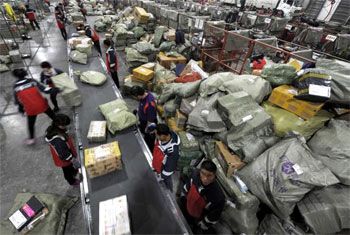The international investors who are investing, merging and shaping India’s new ecommerce start-ups are betting that if China can produce an Alibaba with an expected market value of $ 170+ billion market value when it does its IPO, India should produce at least one or two with a $5bn+ market value, says Ajit Balakrishnan.
 Can all these web businesses that sell mobile phones, books and apparel 10-20 per cent below the cost of what is available at retail shops and delivered free of charges home to you be for real? Will it all come crashing down?
Can all these web businesses that sell mobile phones, books and apparel 10-20 per cent below the cost of what is available at retail shops and delivered free of charges home to you be for real? Will it all come crashing down?
Or, perish the thought, is it one of India’s periodic spectacles that start with gushing media accounts of outsized company valuations, hitherto unknown entrepreneurs now being heralded as millionaires, which then leads to a grand denouement in which the same businessmen are then shown in rumpled clothes, with stoic expressions, being led away by the CBI to Tihar jail?
Or, is all this a sign of India being dragged to its long overdue entry into the ecommerce era?
Why long overdue? Because the percentage of all retail sales served by “organised” retail, ie, non-mom-and-pop stores, and is considered a measure of a country’s modernity and by that measure, in India is a tiny three pc compared to our sibling rival China at 13 pc and European countries and the United States at 50 pc+.
Why dragged? Because the infrastructure that would have naturally led to ecommerce, the companies who could have provided widespread availability of credit and debit cards and reasonably priced broadband access have all being looking the other way while the world transitioned to the new economy.
I should know; it was on Independence Day 1998, that is to say, 15 years ago, that I grandly declared at a press conference to an audience of puzzled journalists that Indian consumers could from now on, from their PC, “choose from over 40,000 music titles and 100,000 book titles to order online with discounts up to 40 pc, or make bookings in over a 180 carefully chosen hi-quality reasonably priced hotels”.
For the next few years a few of us folks battled a narrow broadband user-base, a steeply depreciating rupee that made PCs progressively more out of reach every year and poor credit card penetration; even a cash on delivery payment system we launched in 1999 seemed to be of no avail.
What woke up a somnolent Indian ecommerce industry that the rest of us had just about given up on was that a clutch of US private equity funds led by Tiger Global, had the vision to note that a consumer ecommerce market could be created in India because India had a per capita consumer expenditure roughly at the level of Brazil and China where ecommerce was flourishing.
Since then, this group, and others who joined them, have invested large dollops of capital, by some accounts $2.5 billion, or Rs 15,000 crores, in 2012 and 2013, into dozens of Indian ecommerce start-ups. These investors have then encouraged the ones who lagged behind in growth to merge with the ones which were forging ahead in an attempt to create at least one or two ecommerce companies that could make it to an IPO in the New York stock markets before the current euphoria about Asian ecommerce triggered by the impending IPO in New York of China’s ecommerce company Alibaba, ends.
Alibaba! Its annual revenues are $248 billion, about three times that of eBay worldwide and two-and-a-half times that of Amazon. Alibaba is also hugely profitable, its profit in a recent quarter was in excess of a billion dollars unlike Amazon which reported a loss.
The international investors who are investing, merging and shaping India’s new ecommerce start-ups are betting that if China can produce an Alibaba with an expected market value of $ 170+ billion market value when it does its IPO, India should produce at least one or two with a $5bn+ market value.
There are many reasons why India may go the China path in its adoption of ecommerce. Organised retail companies that have the scale, management expertise and the information technology infrastructure to deliver consistently high quality and low cost goods, have never found a real foothold in China or in India.
In China, for instance, such large retailers’ reach, even in urban areas, is a mere 10 pc; in India even smaller. On the other hand, the Internet reaches more than half of China’s population, so selling things online in China makes eminent sense.
India’s internet reach is only 11 pc now, but should it get to even 25 pc, as it is likely to in the next few years, one can easily imagine more than a handful of multi-billion dollar ecommerce players from India.
Indian ecommerce, so far, has merely taken its first wondrous baby steps.
Image: Workers sort packages at a logistics hub in Jinan, Shandong province, China. Photograph: Reuters
Ajit Balakrishnan, the founder and CEO of rediff.com, is the author of The Wave Rider: A Chronicle of the Information Age. Email: ajitb@rediffmail.com.










